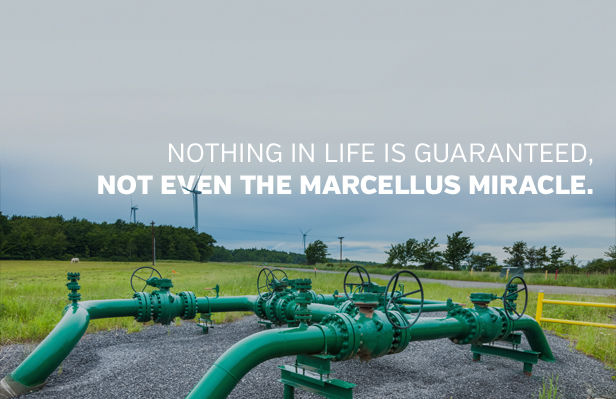Commentary

New Tax Would Add to Challenges of Gas Industry
Note: This commentary was first published in the Pittsburgh Post-Gazette.
Armstrong County farmer Randy Walker worries about the effect of a natural gas severance tax on his royalties and the job market.
“A tax at the wellhead taxes my share and the company’s share,” says Mr. Walker. He adds, however, that he is most concerned about local jobs that could be lost if drilling is discouraged by a severance tax.
Mr. Walker’s concerns are well founded. The natural gas industry is facing marketplace challenges that would be exacerbated by a severance tax.
By the end of 2014, natural gas drilling in the Northeast—mainly Pennsylvania—will have added 13.4 billion cubic feet to daily gas production nationwide since 2008. Meanwhile, output in the rest of the U.S. has remained essentially flat, according to Bentek Energy, an energy market analytics company.
This unprecedented growth in Pennsylvania is good news, but it creates its own set of problems.
Buried in reports that gas production from Marcellus Shale is at an all-time high is the fact that the growth in new wells is slowing.
In 2012, the U.S. Energy Information Agency reported an industry estimate of “over 1,000 natural gas wells that have been drilled in northern Pennsylvania but which are not yet producing natural gas because there is not enough interstate and gathering pipeline infrastructure to accommodate the new production.”
Today, we have significantly more gas available for extraction than pipelines to ship it to market — a fact that has spawned a number of projects for new pipelines. In the meantime, the shortage of pipelines drives up the cost of getting gas to consumers.
These delivery challenges are impacting drillers’ bottom lines. In July, Pittsburgh-based EQT Corp. reported the prices it could get for gas in the second quarter were 18 percent below a national benchmark.
Transportation costs are so high that “dry-gas wells” — wells without lucrative byproducts like butane and propane — are barely worth developing. Monthly starts for new dry-gas wells in Pennsylvania have fallen nearly 50 percent after peaking in 2011.
“While high quality core areas remain economically attractive, at least 70 percent of the Marcellus’s potentially producible dry gas is only marginally economic in today’s competitive market,” says petroleum geologist Gregory Wrightstone in Sewickley.
Many companies have either shut down or reduced drilling in dry-gas areas to focus on the more economic liquids-rich areas of the Marcellus, the Ohio Utica or shale plays farther west.
Even with the industry carrying the costs of current transportation constraints, some of the highest business taxes in the world and a natural gas impact fee, some special interest groups want drillers to pay even more through a severance tax that could undermine the viability of Pennsylvania’s gas industry.
Such a tax would affect more than drilling companies. “A new tax on gas would be extremely damaging to Pennsylvania’s economy and particularly to areas like Lycoming County and Williamsport,” said Vincent Matteo, president and CEO of the Williamsport/Lycoming Chamber of Commerce.
Mr. Matteo adds that while his area is doing well, there has recently been a slowdown in the regional economy. Taxing natural gas production would create a ripple effect, affecting employment opportunities in support industries as well as jobs in restaurants and retail.
Despite the remarkable performance of Pennsylvania’s gas producers, the natural gas industry remains subject to real-world economics. A severance tax would stunt drilling across the state to the detriment of communities like Lycoming County, landowners like Randy and natural gas consumers across the state.
Nothing in life is guaranteed, not even the Marcellus miracle. A severance tax will compromise the sustainability of the Marcellus Shale, along with our economic prosperity and energy security.
# # #
Gordon Tomb is a senior fellow for the Commonwealth Foundation (CommonwealthFoundation.org), Pennsylvania’s free market think tank.